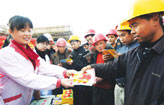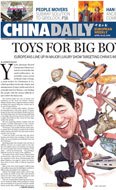Center
New contract brings new energy to Chinese GP
Updated: 2011-04-18 09:26
(Xinhua)
SHANGHAI - Sitting in his office, race CEO Jiang Lan can view the Shanghai International Circuit through the window. But in his mind there is a more ambitious view, a view of the Chinese Grand Prix with bright future in the new seven-year contract.
Since the Chinese GP was included in the Formula One calendar in 2004, the Shanghai International Circuit (SIC) located in the town of Jiading in the outskirt of Shanghai has witnessed seven jubilant world elite drivers celebrating in champagne shower.
|
||||
Despite of the complaints, race organizers Juss Events and F1 inked a new seven-year contract in February after F1 bosses agreed to charge a reduced rate and the Chinese GP will be extended till 2017. The price of tickets for the 2011 event has been largely cut down and a series of new moves, including allowing some spectators to visit the pitlane after the race, have been made to address problems of the losses and poor attendance.
Although the return of the German F1 legend Michael Schumacher helped ticket sales to recover from a low of 120,000 in 2009, the Shanghai race has seen attendance drop from a peak of 270,000 spectators in 2005 to 155,000 in 2010.
"The attendance has increased by nearly 60 percent compared with last year," said Jiang Lan on Sunday.
"We cut the ticket price, but the boosted tickets sale can well make up the loss and we are expecting a higher box income than last year," added the race CEO and also general manager of Juss Events, a government owned sports organizing company.
In order to attract more fans to come to SIC, only cutting the tickets price is not enough. According to Jiang, more suppliers are invited to join the snacks center this year to provide a more diversified and high-qualify food service to the fans. And a specially designed headset, named Fandio No. 1, which can not only keep the noise but also receive the live broadcast, has also been introduced to the fans.
"Our aim is to impress the fans with our high standard service, " said Jiang. "We also introduced a free child ticket system. Each fan with a full price ticket can bring in a child, who is not taller than 1.2 meters, for free. That's part of our plans to develop future F1 fans."
Even with the box income going up this year, Jiang have to admit that Chinese GP is losing money every year. But in Jiang's mind, he has a different calculate method.
"Only focusing on the losses was too simplistic. The importance of Chinese Grand Prix go well beyond merely a commercial deal," said Jiang. "Holding the race in Shanghai will benefit the image of the city as well as the country."
Jiang's point was echoed by Norbert Haug, Mercedes motorsport vice-president. "A lot of people get to know Shanghai well as they follow the sport to China, and a lot of Chinese get to know F1. Through holding the race the country, the city, and the sport in China will all benefit," said Haug in an interview prior to the event.
As the economic center in China, the coastal city never hesitates to bolster its standing in the world. Like the Expo 2010, F1 race is considered as a top-class event with great influence which can effectively promote the city's image as an international metropolis.
"F1 is a super great event with super great influence. How to use and exploit such influence will be our top concern in the new seven years," Jiang said. "During the first seven years, we did not have enough experience to hold such a world top-level event. Staging a safe and successful race turned to be our priority by then. But now, we have accumulated enough experience on how to organize the race, our focus should be switched how to develop and make good use of it."
Jiang's ambition is to develop the Chinese GP into a multi-functional platform, a platform for the local government to attract bussiness investment, an opportunity for the city to boost tourism, a shortcut for local brands to go to the world, as well as a festival to entertain the citizens, especially the fans.
"The F1 sport has a long history, but we only have seven years of experience holding the event in China. If I have 30 years, I am sure the race will be much better and more mature than it is now," said a confident Jiang. "The deficit is not the most important thing. And I believe the deficit in my accounting books will turn to be the payoff in the mayor's."
E-paper

Han me downs
Traditional 3,000-year-old clothes are making a comeback.
Reaching out
Fast growth fuels rise in super rich
Chinese tourists spend more
Specials

Big spenders
More mainland tourists are expected to spend money on overseas travel this year.

Rise in super rich
Report cites rising property prices, gdp as key drivers of increasing number of chinese millionaires.

Reaching out
Condom makers are stepping up their presence in smaller cities to boost sales




